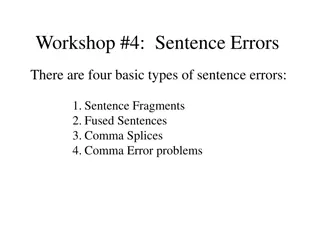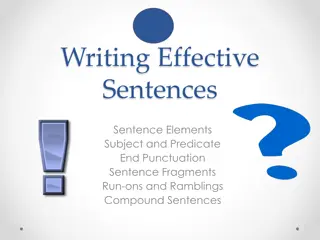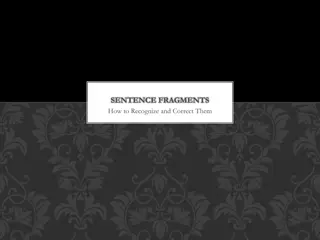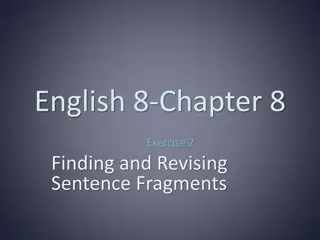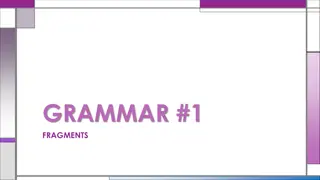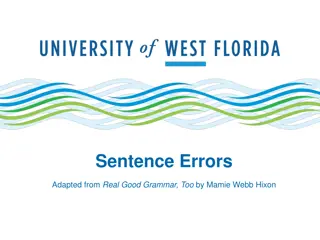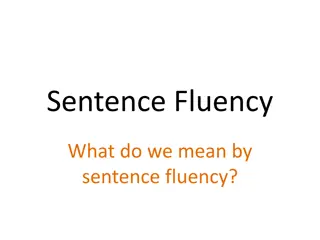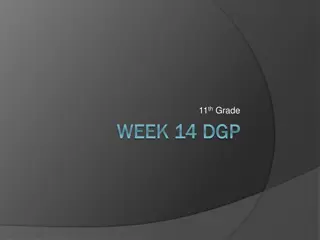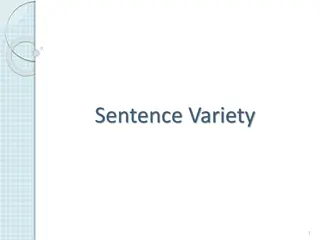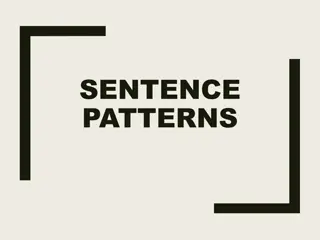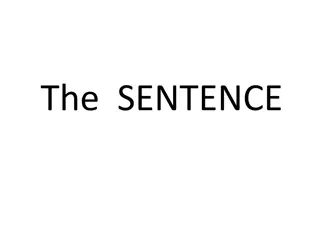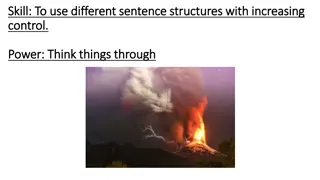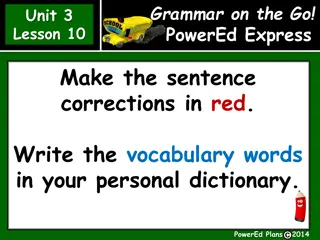Understanding Sentence Fragments in Writing
A sentence fragment is an incomplete construction that may lack a subject and a verb. While some intentional fragments can be used in writing for emphasis or transitions, most are considered unacceptable in academic and professional writing. Dependent clauses are common types of fragments and can be corrected by joining them with independent clauses. Practice exercises help in identifying and correcting sentence fragments effectively.
Download Presentation

Please find below an Image/Link to download the presentation.
The content on the website is provided AS IS for your information and personal use only. It may not be sold, licensed, or shared on other websites without obtaining consent from the author. Download presentation by click this link. If you encounter any issues during the download, it is possible that the publisher has removed the file from their server.
E N D
Presentation Transcript
Writing Lab Sentence Fragments
Sentence Fragments A sentence fragment is an incomplete construction which may or may not have a subject and a verb. Specifically, a fragment is a group of words pretending to be a sentence. It is punctuated and capitalized as if it were a sentence, and it may even have a subject and a verb.
Sentence Fragments cont. Although sentence fragments are common, fragments are usually unacceptable in academic and professional writing. Some fragments are intentional. Skillful writers use them for emphasis, for answers to questions, for transitions, for exclamations, and for advertising jingles. Since writers and readers do not always agree on when fragments are intentional, it is always safer to write in complete sentences.
Dependent Clause The dependent clause is one of the most common sentence fragments. Although a dependent clause has a subject and a verb, it is always introduced by a subordinating conjunction (as, as if, although, since, because, while, until, before, if, when) or a relative pronoun (who, which, that) and thus cannot be treated as a complete thought.
Correcting Fragments Join a dependent clause to an independent clause, or make the dependent clause into an independent one. Incorrect: The study showed that many employees eventually begin to neglect their duties. Because they become bored with their jobs. Correct: The study showed that many employees eventually begin to neglect their duties because they become bored with their jobs.
Lets Practice! Incorrect: The two girls next door, although they mean well and do not realize that their constant borrowing of sugar, eggs, and milk and their inquisitiveness about everyone else in the apartment complex. Correct: The two girls next door, although they mean well and do not realize that their constant borrowing of sugar, eggs, and milk and their inquisitiveness about everyone else in the apartment complex are annoying, are, fortunately, quiet.
Lets Practice! cont. Incorrect: Marcy was excited about working in Washington. But was also somewhat apprehensive. Correct: Marcy was excited about working in Washington but was also somewhat apprehensive. Incorrect: Dorothy and her friends went to Emerald City. Singing and Dancing down Yellowbrick Road. Correct: Singing and dancing down Yellowbrick Road, Dorothy and her friends went to Emerald City.
Lets Practice! cont. 2 Incorrect: His immediate aim in life is centered around two things. Becoming an engineer and learning to fly an airplane. Correct: His immediate aim in life is centered around two things, becoming an engineer and learning to fly an airplane. Incorrect: You should not make such statements; although they are correct. Correct: You should not make such statements, although they are correct.
Lets Practice! cont. 3 Incorrect: Not for all the tea in China. I won t do it. Correct: I won t do it for all the tea in China. Incorrect: I categorically refuse to abide by these ridiculous rules. Whether you like it or not. Correct: I categorically refuse to abide by these ridiculous rules whether you like it or not.
Thats all, folks! This lesson is part of the UWF Writing Lab Grammar Mini-Lesson Series Lessons adapted from Real Good Grammar, Too by Mamie Webb Hixon To find out more, visit the Writing Lab s website where you can take a self-scoring quiz corresponding to this lesson



